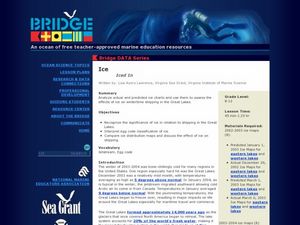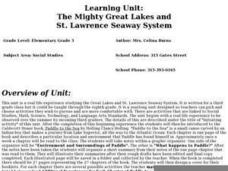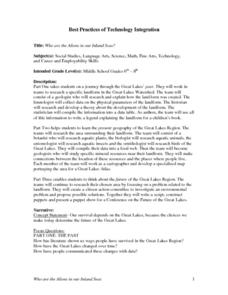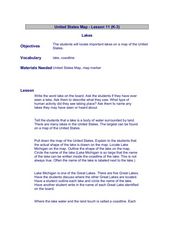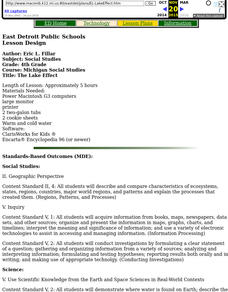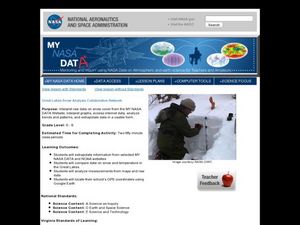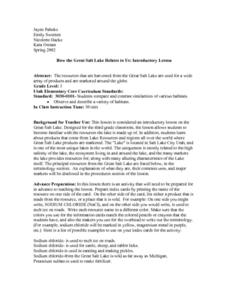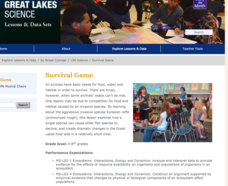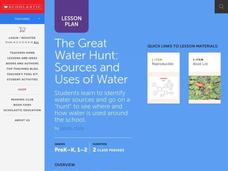Curated OER
Iced In
Introduce junior oceanographers to ice conditions in The Great Lakes. The ice map links are no longer available, so you will not be able to have your class perform the mentioned data activity. You can, however, access the Canadian Ice...
Curated OER
Great Lakes Wildlife Word Search
In this word search worksheet, students locate the names of a variety of wildlife that is found in the Great Lakes region. They use 18 pictures and their labels to find the names in the puzzle.
Curated OER
Ancient Hunters of the Great Lakes
Students describe theories on how the first humans came to America and show the evidence that supports it. In this investigative lesson students study given material and prepare written or oral reports in their groups.
Curated OER
The Mighty Great Lakes and St. Lawrence Seaway System
Students participate in a variety of activities in a unit about the Great Lakes/St. Lawrence Seaway System. They create a diorama, read related stories, and correspond with other classes located in other port cities along the St Lawrence...
Curated OER
How to Make a Lake
Students examine the Michigan state quarter and discuss the effects glaciers have on land formation. They perform an investigate using ice cubes and sand to show how glaciers have carved the land.
Curated OER
Crimes on the Great Lakes
Students solve simulated crimes using real-time online information. They research data on items such as ship tracking through GPS, lake conditions, and weather systems. They also collect information about invasive plant and animal...
Curated OER
Great Lakes Birds Word Search
In this science worksheet, 5th graders will focus on the names of Great Lakes birds. Students will locate the names of 16 birds in the word search.
Curated OER
The Big Blow
Young scholars identify and explain factors that contribute to extreme storms in the Great Lakes. In this investigative lesson students study the weather systems in the Great Lakes and compare cyclones to tropical storms.
Curated OER
Which Part of the Great Salt Lake Stinks More?
Students research background knowledge of the Great Salt Lake prior to a field trip. They identify specific wild life at the Great Salt Lake on the field trip and identify the islands in the Great Salt Lake. They present their...
Curated OER
Impact of Invasive Species on Food Webs and Ecosystems
Fifth graders explore how invasive species affect the Great Lakes. In this science lesson, 5th graders research invasive species and create a food chain involving the invasive species. Students discuss how the environment is affected by...
Curated OER
Who Are the Aliens in Our Inland Seas?
Students work in teams to research specific landforms in Great Lakes Watershed, compile information into data table, and write legend explaining landform for children's book. Students then research area surrounding landform, compile...
Curated OER
Great Lakes Watershed
Eighth graders construct a watershed model. In this earth science lesson, 8th graders compare the Great Lakes watershed to others in the country. They explain its in the ecosystem.
Curated OER
United States Map - Lesson 11
Young scholars explore lakes of the United States. In this geography instructional activity, students identify noteworthy lakes on a map of the United States.
Curated OER
The Lake Effect
Fourth graders conduct an experiment demonstrating the effects of water and air temperature on precipitation. They create graphs demonstrating their findings using Claris Works for Kids.
Curated OER
Great Lakes Snow Analysis Collaborative Network
Students interpret data on snow cover and analyze trend patterns. In this snow activity students compare data and locate their school's GPS coordinates.
Michigan Sea Grant
Great Lakes, Great Careers
Pupils play a question-asking game to investigate careers relating to marine and aquatic science, then conduct research to further investigate the career of their choice—examples range from marine veterinarian to underwater...
Curated OER
Pike Problems in Lake Davis
Pike fish pose a threat to native trout and catfish in lakes. Would you drain and poison a lake to get rid of the Pike fish? If the lake was drained and poisoned, then refilled and repopulated with trout and catfish, how would you...
Curated OER
Becoming the Great Lakes Invasive Species Czar: A Game to Show the Difficulty in Controlling Invasive Species
Tenth graders explore different ways to control aquatic invasive species. For this ecology lesson, 10th graders play the role of a member of the Dept of Natural Resources. They decide whether money should be spent on control or...
Curated OER
How the Great Salt Lake Relates To Us
Third graders name at least three resources that come for the Great Salt Lake. They describe at least one product that is made from each resource. They name and locate on a map at least five different geographic regions where Great...
Michigan Sea Grant
Survival Game
Musical chairs may be a classic game, but Ruffe Musical Chairs is a unique lesson on invasive species! Using the time-honored game, pupils role play the behaviors of the invasive fish called Eurasian ruffe. Learning about this aggressive...
Curated OER
Pollution Assessment: Is Wood Lake a Good Lake?
Students become aware of pollution in Richfield Minnesota's Wood Lake, identify sources of pollution in Wood Lake, learn to use variables, equations, spreadsheets and modeling software, and generate solutions for the problem.
Curated OER
Bell Live! The Great Lakes: A Superior Adventure
Students participate in a virtual field trip to Lake Superior. In groups, they perform experiments in which test the level of toxins and bacteria in the water. They also watch video segments life in the lake and discuss their observations.
Curated OER
The Great Water Hunt
Students create a model of the land to water ratio in a large group and search for all the places water is used at their school while on a Great Water Hunt. They identify where water can be found and compare how much of world is covered...
Curated OER
the New Explorers:Into the Depths
Students explore the self preservation mechanism that is inherent in the Great Lakes. They examine how scientists are studying Great Lakes, and what their predictions are for these national treasures.


